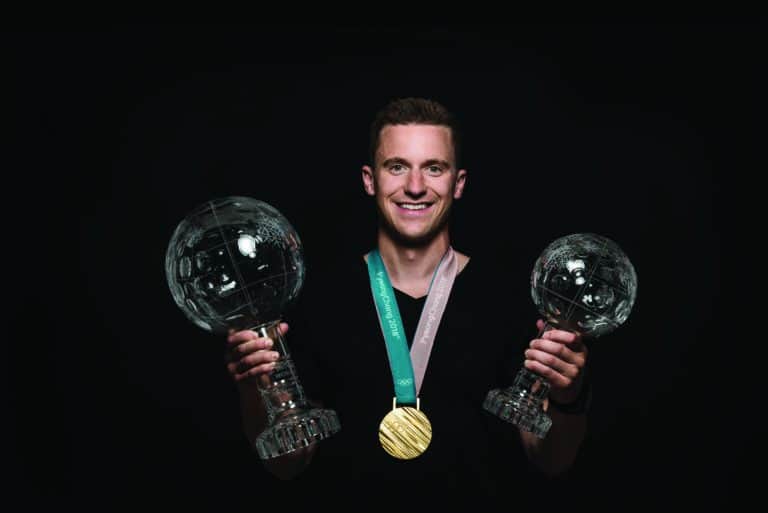Growth Mindset – One Small Step at a Time Towards Success

Your sport may be uppermost in your mind, training and competing are what you live for. So how can you succeed in both sport and at school?
Without a doubt, doing well in both sport and at school requires organisation, dedication and determination. At Hochalpines Institut Ftan (HIF), Swiss International School and Sports Academy, a team of teachers, tutors, pastoral staff and coaches are at the young athlete’s side to help find the right balance. They help to plan a programme consisting of an individual training schedule and study plan. They also monitor the progress in sport and in the classroom and help stay on track. Students can thus emerge from the experience stronger and equipped with the life skills they need to build their career.
Mistakes and failures are part of the learning process
For Canaan Pollock, Head of the Regional Performance Centre (RLZ) for Alpine skiing at HIF Swiss International School and Sports Academy, rapid sporting success will never be the focus in his work with young athletes. Instead, the sports scientist and alpine skiing coach from the USA builds on each and every young athlete’s personal responsibility, both on the slopes and at school.
With the “Growth Mindset” approach to learning, Pollock aims at motivating his young athletes and showing them that mistakes and failure are part of their personal and athletic growth. “By first developing a strong character, an athlete can understand more than just what he sees immediately. When an athlete gets to know himself better, he learns to take responsibility for his training and his decisions. The mind becomes open for new ideas. And with an open mind, the athlete becomes more resilient to change, mistakes and disappointment”, the expert outlines the philosophy that was introduced at HIF Swiss International School as one of the key coaching tools – and not only in the Sports Academy.
Believe in yourself
Sport is a core element in the school curriculum of all HIF students. It promotes health and well-being, but also resistance, self-discipline and team spirit – essential qualities of future leaders. Pollock wants to promote these soft skills even further. When the young athletes start to learn that they can become better and “smarter”, they also understand that effort is necessary. “It’s all about learning and becoming smarter every day,” says Pollock.
Pollock knows that if students spend more time and willpower on this goal, they will be successful. “They basically learn to believe in this concept,” explains the scientist and coach, pointing out that in the process of learning, unknown blockages, lack of self-confidence and lack of belief in continuous progress often become obstacles. The aim of the concept is to prepare young people for the constantly increasing demands of society and to give them the opportunity to cope well with the pressure to succeed at school, in sport, but also in life. With the appropriate training units, Pollock tries to create an environment in which the athletes themselves can find answers, according to their character and personality.
The teacher is a talent scout
Like the coach and the athlete, the teacher and the student are also involved in a collaborative process. The teacher, too, is a talent scout, a listener rather than a talker, a motivator and a critical friend who can help the student develop the self-belief to leave their comfort zone and experience the exhilaration of taking a risk and succeeding.
Classroom teachers can learn so much from the skills that coaches apply: the power of observation, to look closely at how a student is performing, to note the smallest of factors that are preventing the student from becoming even better. Good teachers and coaches are experts at formative assessment in the way they give precise feedback which the student and athlete can then use to optimise his performance. The coach is an expert in teaching meta-cognitive skills: he helps athletes to reflect on their performance, to observe themselves self-critically and to guide them to becoming the best athlete they can be. This is also key to successful learning in the classroom and will make all the difference.

You don’t become a world success overnight
Coaches can motivate, can help athletes develop self-belief and determination. They convey to the athlete the conviction that they can do better, that they can pick themselves up and learn from failure or defeat. Coaches can get athletes back on track after injury or serious setbacks. Coaches can help athletes set goals which are within their reach. This is provided they patiently stick to it and open themselves to new approaches. You don’t become a world success overnight. You take it one small step at a time. But you can’t do it on your own. You need your coach. Or maybe your teacher.
Find out more about Hochalpines Institut Ftan here
More from International School Parent
Find more articles like this here: www.internationalschoolparent.com/articles/
Want to write for us? If so, you can submit an article for consideration here: www.internationalschoolparent.submittable.com
